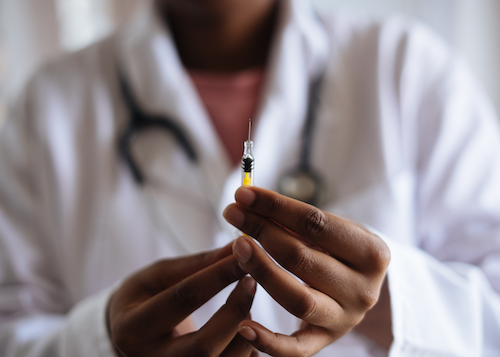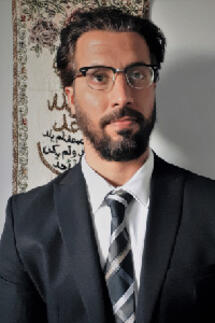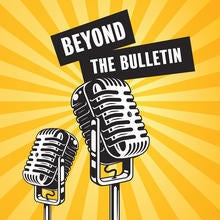Editor:
Brandon Sweet
University Communications
bulletin@uwaterloo.ca
Vaccination centre to open at Health Services

The University of Waterloo will open a vaccine centre at Health Services for students and employees beginning Monday, July 12.
"This is a positive step for the University and an important piece of our overall plans to support a safe and staged return to campus," wrote President Vivek Goel in a memo distributed to campus yesterday afternoon. "An on-campus vaccine centre for students, employees, and their families will help more of our University community get vaccinated, which is critical as we work towards more in-person campus experiences in September."
"I encourage everyone in our campus community to get their first or second dose as soon as possible," Goel writes. "This advice follows that of local public health officials, the Ontario and Federal governments and the World Health Organization regarding how best to contain the pandemic and safely re-open our communities."
The vaccine centre is open to all students, employees, and family members of students and employees that are 18 years and older. The vaccine centre will be distributing Moderna, an mRNA vaccine that requires two doses 28 days apart. The vaccine centre will be open Monday to Friday, 9:00 a.m. to 12 noon.
Please note: You must be free of COVID-19 symptoms and have completed the daily campus check-in to attend the centre for vaccination.
You must book an appointment in advance. Please call 519-888-4096 to book your appointment. Be prepared to provide the following information:
- Full legal name
- Student ID # (if applicable)
- Address (including postal code)
- Telephone number
- UWaterloo email address
- Health insurance information (Provincial Health card or UHIP information)
- Current vaccination status (partially vaccinated or not vaccinated) and the type of vaccination you received if applicable. If you are unsure of your vaccination status (obtained vaccinations in another country or are unsure if you are able to receive a vaccine), please visit call Public Health at 519-575 4400 or read about COVID-19 vaccine guidance from the Ministry of Health.
Learn more about the on-campus COVID-19 vaccine centre.
If you are currently seeking a vaccine, we strongly encourage you to visit a vaccine centre as soon as possible: whether it is our on-campus site or another vaccine centre in the region.
"Lastly, with the recent announcement that Waterloo Region is moving into Step 2 on Monday, you can expect an update on this early next week," President Goel's memo concludes.
Q and A with the experts: addressing Islamophobia in our community

After a motorist drove into a family out for a walk killing four of them, police said it was deliberate and the driver targeted them because of their Muslim faith. The accused faces charges of first-degree and attempted murder, as well as terrorism. Amir Al-Azraki is a professor of Arabic language, literature and culture, and co-ordinator of Studies in Islamic and Arab Cultures at Renison University College. He recently discussed Islamophobia in our communities on the University’s Beyond the Bulletin podcast. This is an excerpt that has been condensed for length.
Madiha Salman, her husband, Salman Afzaal, their children Yumna and Fayez, and Salman's mother Talat were all out for a stroll on a Sunday, when they were hit in what many are saying was a premeditated, hate-motivated act of Islamophobia by a terrorist. What were your thoughts when you heard?
The tragedy that happened in London was not a random or isolated incident. I think it was a culminating scene of the violence and hatred Muslims face daily in Canada. I have personally witnessed Islamophobia, and there is growing evidence of rising Islamophobia. Looking at the statistics, the number of anti-Muslim hate crimes increased from 166 incidents in 2018 to 181 in 2019. These are only the reported incidents. Canadians for Justice and Peace in the Middle East released a survey indicating that Canadians are least comfortable with a figure of authority who wears a hijab versus any other type of religious garb.
What do you want people to know about Islam?
Islam is not an ethnicity. Islam is a religion that includes all kinds of people, and different cultures from around the world. A lot of these hatred problems, hatred crimes occur because of their ignorance of the Muslim community. Go to your Muslim neighbours, and have a talk, learn about their life. They share humanity, they share all these human values that we have as people living together. Islamophobia is not only in Canada. I appreciate being here in Canada, but this does not deny the fact that we have hatred of Muslims here. Hatred against Muslims does not begin with a truck driver killing innocent Muslim people on the sidewalk. Islamophobia begins with bigotry in our homes and schools, workplaces, and communities. If Canadians want to show some solidarity, if they want to address the problem, they must take action and not have to wait for politicians or the government to come together. The actions taken against Islamophobia need to be an ongoing effort, not just a reaction to tragedies.
What do you cover in the Studies in Islamic and Arab Cultures program that you co-ordinate?
The students in the program study Islamic and Arab cultures in the fine arts, language, literature, drama, history, politics, science, anthropology, social development, gender and sex, and a myriad of other disciplines. The goal of the program is to bring together multiple perspectives and teach students how to deconstruct essentialist caricatures of religions, cultures, genders, and other labels that lend themselves to stereotypes. I am also a theatre practitioner; I use Theatre of the Oppressed to address social justice issues and human rights issues. One of the techniques of Theatre of the Oppressed, called forum theatre, is like a theatrical game that seeks to motivate people. The audience will intervene in a scenario, either by suggesting something to the actor, or by replacing one of the actors. If a bystander supports the oppressed, other bystanders may join in their support. And this intervention changes passive spectators. It will not necessarily solve the problem itself, but this practice helps to create good citizens who are responsible towards each other.
The podcast episode includes additional ways to provide support.
Professor Amir Al-Azraki's primary areas of research interest are Comparative Literature (Arabic and English), Forum Theatre and social change, drama in Education and Language Pedagogy, and in the representation of political violence in modern Arabic and English drama.
A small problem with huge implications

This article was originally featured on Waterloo News.
New research is showing that some tiny catalysts being considered for industrial-scaled environmental remediation efforts may be unstable during operation.
Chemists from the University of Waterloo studied the structures of complex catalysts known as “nanoscale electrocatalysts” and found that they are not as stable as scientists once thought. When electricity flows through them during use, the atoms may rearrange. In some cases, the researchers found, electrocatalysts degrade completely.
Understanding why and how this rearrangement and degradation happens is the first step to using these nanoscale electrocatalysts in environmental remediation efforts such as removing atmospheric carbon dioxide and groundwater contaminants and transforming them into higher-value products such as fuels.
“Current electrocatalysts rely on complex nanoscale structures in order to optimize their efficiency,” said Anna Klinkova, a professor in Waterloo’s Department of Chemistry. “What we found, however, is that the superior performance of these complex nanomaterials often come at a cost of their gradual structural degradation, as there is a trade-off between their effectiveness and stability.”
Klinkova and her team discovered that the rearrangement of atoms in the catalyst depended on the type of metal, structural shape, and the reaction conditions of the catalyst.
They identified two reasons for the rearrangements. Some small molecules can temporarily attach to the surface of the catalyst and reduce the energy needed for an atom to move across the surface. In other cases, narrow areas within the catalyst concentrate the electron’s current, causing the metal atoms to displace via a process called electromigration.
Electromigration has been previously identified in microelectronics, but this is the first time it has been connected to nanoscale catalysts.
These findings establish a framework for assessing structural stability and mapping the changing geometry of nanoscale catalysts, which is an important step to designing better catalysts in the future.
“These structural effects could be used as one of the design rules in future catalyst development to maximize their stability,” Klinkova said. “You could also purposefully induce reconstruction to a different structure that becomes active as the reaction starts.”
The study, Interplay of electrochemical and electrical effects induces structural transformations in electrocatalysts, was recently published in the journal Nature Catalysis.
Vaccination clinic at Bingemans this weekend and other notes
The Region of Waterloo is holding an "Every Dose Counts" mass vaccination clinic at the Bingemans Conference Centre on Saturday, July 10 and Sunday, July 11. Organizers are hoping for 10,000 inoculations to take place per day.
The University of Waterloo's School of Pharmacy is organizing and providing vaccine draw-up services for the event and Health Services staff have also been invited to participate in clinical and administrative roles.
The clinics run from 8:00 a.m. to 10:00 p.m. on Saturday and Sunday and is open to people ages 12 and up. Attendees aged 12 to 17 will receive a dose of the Pfizer vaccine, while Moderna will be available for everyone 18 years of age and older. Walk-ins will be welcome for first doses. To make it easier to get to Bingemans Conference Centre, a free shuttle bus will be running every 20 minutes between Central Station (stop 1474 at King and Victoria) and Bingemans. More information is available on the Grand River Transit website.
Choose "Bingemans Conference Centre" as the clinic when booking at http://regionofwaterloo.ca/VaccineBook for a first or second dose of the vaccine.

Co-operative and Experiential Education's Work-Learn Institute will be hosting the third event in the multi-part Future-Ready Workforce Series entitled Converting & Retaining the Next Generation of Talent on Wednesday, July 14.
"As today’s workforce changes, organizations face increased competition to invest in young talent," says the event background info. "As demographic shifts see large pools of talent nearing retirement, and declining birth rates shrinking the available workforce, there’s never been a more important time to bring Gen Z into your organization."
During this online event, presenters will share how you can improve your strategies for converting and retaining young talent by:
- aligning your organizational values with the values of your young talent;
- creating a supportive and connected company culture; and
- providing meaningful work and development opportunities.
In addition, attendees will hear student and employer perspectives about how they're adapting to today's conversion and retention trends and experiences.
The event takes place at 12 noon on Wednesday. Register now.
Beyond the Bulletin Episode 94

The latest episode of the Beyond the Bulletin Podcast is now live. After listening and learning about residential schools, Danielle Robichaud uses her skills as an archivist in the UWaterloo library to help in a meaningful way. Vivek Goel begins his tenure as Waterloo's seventh president. The demonstration of an autonomous shuttle bus marks a significant milestone in including autonomous transportation on the main campus. And PART launches a book club.
Link of the day
A decade of independence for South Sudan
When and Where to get support
Students can visit the Student Success Office online for supports including academic development, international student resources, leadership development, exchange and study abroad, and opportunities to get involved.
Instructors can visit the Keep Learning website to get support on adapting their teaching and learning plans for an online environment.
Course templates are available within your course in LEARN to help you build and edit your content and assignment pages quickly.
The following workshops, webinars, and events are offered by the KL team (CTE, CEL, ITMS, LIB):
- Independent Remote Course Design Essentials, self-directed, continuous self-enrollment course in LEARN.
- Getting Ready to Facilitate Online Courses: TA Training, beginning Monday, May 3.
-
Finding Library Materials: Helping instructors support students in online classes offered July 8
-
WAI Inspired Wednesdays: Designing authentic assessments (CTE7010), Wednesday, July 14, 10:00 a.m.
-
Introduction to PebblePad: What is PebblePad and Why Would I use it? Thursday, July 15, 10:00 a.m.
Employees can access resources to help them work remotely, including managing University records and privacy of personal information. Here are some tips for staying healthy while working from home.
Stay informed about COVID cases on campus by consulting the COVID case tracker.
The Writing and Communication Centre has virtual services and programs to help undergrads, grad students, postdocs and faculty members with academic writing.
- Meet with writing advisors in one-to-one appointments to brainstorm, draft, revise, and polish. No time for an appointment? Try email tutoring for undergrads.
- Beat isolation and make writing progress at weekly Virtual Writing Cafés for grad students and faculty or PJ-Friendly Writing Groups for Undergrads.
- Take an online workshop or apply to our popular Dissertation Boot Camp program.
- Faculty can request custom in-class workshops for their courses, or the WCC can facilitate any existing workshops for student groups.
Co-op students can get help finding a job and find supports to successfully work remotely, develop new skills, access wellness and career information, and contact a co-op or career advisor.
The Centre for Career Action assists undergraduates, graduate students, postdocs, staff, faculty, and alumni through navigating career services that are right for them. You can attend a one-on-one appointment or same day drop-in session at the CCA for assistance with cover letter writing, career planning and much more. You can also book an appointment online or visit our Live Chat to connect with our Client Support Team. The CCA is here to help you.
If you feel overwhelmed or anxious and need to talk to somebody, please contact the University’s Campus Wellness services, either Health Services or Counselling Services. You can also contact the University's Centre for Mental Health Research and Treatment. Good2Talk is a post-secondary student helpline available to all students.
The Library has published a resource guide on how to avoid information overload.
The Faculty Association of the University of Waterloo (FAUW) continues to advocate for its members. Check out the FAUW blog for more information.
The University of Waterloo Staff Association (UWSA) continues to advocate for its members. Check out the UWSA blog for more information.
The Indigenous Initiatives Office is a central hub that provides guidance, support, and resources to all Indigenous and non-Indigenous campus community members and oversees the university Indigenization strategy.
The Waterloo Indigenous Student Centre, based at St. Paul’s University College, provides support and resources for Indigenous students, and educational outreach programs for the broader community, including lectures, and events.
WUSA supports for students:
Peer support - MATES, Glow Centre, RAISE, Women’s Centre - Visit https://wusa.ca/peersupport to book an appointment
Bike Centre – Open via Appointments and Rentals
Campus Response Team, ICSN, Off Campus Community and Co-op Connection all available online. Check https://wusa.ca for more details.
Food Support Service food hampers are currently available from the Turnkey Desk on weekdays from 7:30 a.m. to 7:00 p.m. in the Student Life Centre. If you have any questions please email us at foodsupport@wusa.ca.
Centre for Academic Policy Support - CAPS is here to assist Waterloo undergraduates throughout their experience in navigating academic policy in the instances of filing petitions, grievances and appeals. Please contact them at caps@wusa.ca. More information is available.
WUSA Commissioners who can help in a variety of areas that students may be experiencing during this time:
- Equity – equity@wusa.ca
- Co-op and Experiential Affairs – coop.affairs@wusa.ca
WUSA Student Legal Protection Program- Seeking legal counsel can be intimidating, especially if it’s your first time facing a legal issue. The legal assistance helpline provides quick access to legal advice in any area of law, including criminal. Just call 1-833-202-4571.
Empower Me is a confidential mental health and wellness service that connects students with qualified counsellors 24/7. They can be reached at 1-833-628-5589.
When and Where (but mostly when)
Healthy Warriors at Home(Online Fitness)
Fitness Classes on Warrior Field. Starting June 14. Power Yoga, HIIT and Zumba. Only $4/class. Advanced registration required.
Warriors vs. Laurier Blood Donation Battle. Join your fellow Warriors, donate blood and help us win the Blood Battle against Laurier for a second year in a row. Set up a profile or add the PFL code: UNIV960995 to your account if you have a blood.ca account already. Questions? Contact WarriorsInfo@uwaterloo.ca.
Drop-in to Warrior Virtual Study Halls on Wednesdays from 5:30 p.m. to 7:00 p.m. Come together in this virtual space to set goals and work independently or in groups each week.
Renison English Language Institute continues to offer virtual events and workshops to help students practice their English language skills.
Waterloo International Workshop on Neural Engineering and Rehabilitation, Wednesday, July 7 to Saturday, July 10, 9:00 a.m. to 12 noon, hosted virtually. Registration is required.
UWSA Open Consultation Session - Updated MOA, Monday, July 12, 12:30 p.m.
The future-ready workforce series - Converting & Retaining the Next Generation of Talent, hosted by the University of Waterloo, Tuesday, July 14, 12:00 p.m.
NEW - Renison/WPL Lecture series, Invisible Heartbreak: Personal Support Workers Share Their Front Line Experiences, Tuesday, July 20, 7:00 p.m.
CrySP Speaker Series on Privacy, "Digital fitness instead of blame and entrapment: re-framing "security awareness,"featuring Angela Sasse, Ruhr Universität Bochum, July 23, 11:00 a.m. Zoom link.
UWSA Open Consultation Session - Updated MOA, Tuesday, July 27, 12 noon.